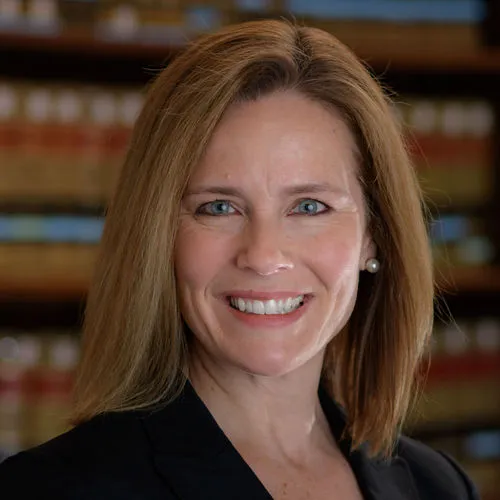Trump nominates Barrett to Supreme Court

on Sep 26, 2020 at 7:06 pm


Judge Amy Coney Barrett (University of Notre Dame)
Shortly after he appointed then-Judge Brett Kavanaugh to fill the vacancy on the Supreme Court created by the retirement of Justice Anthony Kennedy, President Donald Trump reportedly told his advisors that he was “saving” Judge Amy Coney Barrett, another of the finalists for the Kennedy slot, in case Justice Ruth Bader Ginsburg stepped down from the bench. In a ceremony at the White House eight days after Ginsburg’s death on Sept. 18 from pancreatic cancer, Trump carried out that plan on Saturday, announcing the nomination of the 48-year-old Barrett to the Supreme Court. If confirmed, Barrett would be the fifth female justice to serve on the court. And as a successor to the reliably liberal Ginsburg, she would be expected to solidify the court’s conservative majority, moving the court to the right on hot-button social issues, ranging from abortion and affirmative action to gun rights.
The president had announced on Tuesday that he would unveil his nominee on Saturday, but much of the suspense had evaporated by the time he approached the microphone just after 5 p.m. Barrett, whom Trump appointed to the U.S. Court of Appeals for the 7th Circuit in 2017, had been widely viewed as the frontrunner to fill the vacancy created by Ginsburg’s death all week, particularly after there was no indication that Trump had met with any other candidates for the seat. By Friday afternoon, various news outlets, led by CNN, had reported that Barrett would be the nominee; news cameras then filmed Barrett and her family – all dressed for a special occasion – leaving their house on Saturday afternoon, presumably to travel to the airport and on to Washington.
In remarks that were just over 10 minutes long, Trump called for Barrett’s “straightforward and prompt” confirmation, telling the audience assembled in the White House Rose Garden that the “stakes for our country are incredibly high.” Trump began by paying tribute to Ginsburg, calling her a “true American legend” and a “pioneer.” Trump then turned to Barrett, describing her as “one of the nation’s most brilliant and gifted legal minds” who would also be the first mother of school-aged children to serve on the court. After reciting portions of Barrett’s resume, Trump spoke directly to Barrett, telling her, “You are going to be fantastic.”
With qualifications that are “unsurpassed” and a record that is “beyond reproach,” Trump suggested, the confirmation “should be very easy.” Trump then seemed to depart from his script and continued, sarcastically, “I’m sure it will be extremely non-controversial.” Referring to Kavanaugh’s contentious 2018 confirmation, he joked, “We said that the last time, didn’t we?” Trump urged Senate Democrats to give Barrett the “respectful and dignified hearing that she deserves and, frankly, that our country deserves,” and he encouraged members of the press to “refrain from personal and partisan attacks” on Barrett.
Like Trump, Barrett acknowledged Ginsburg’s recent death, emphasizing that Ginsburg had “won the admiration of women across the country and around the world.” Barrett then spoke about her judicial philosophy, explaining that – like Justice Antonin Scalia, for whom she clerked – judges should “apply the law as written.” She also spoke warmly about her husband, Jesse, and seven children, noting (among other things) that their “full” family life included becoming “co-principals of the Barrett E-Learning Academy” after COVID-19 prompted schools to move to distance learning.
Perhaps tacitly addressing the deep divisions in the country and some of the controversy that already surrounds her nomination, Barrett spent much of her short time at the podium trying to convey a message of unity and nonpartisanship. She recalled Scalia’s “poignant” friendship with Ginsburg, noting that they “disagreed fiercely in print without rancor in person.” Their “warm and rich” relationship showed, Barrett said, that arguments “even about matters of great consequence, need not destroy affection” – a standard that she tries to meet in her own relationships. Speaking to her “fellow Americans,” Barrett assured them that the Supreme Court “belongs to all of us,” and she pledged to “assume this role to serve” all Americans impartially.
Barrett concluded by conceding that she had “no illusions that the road ahead of me will be easy, either for the short term or the long haul.” But she promised to “meet the challenge with both humility and courage.” Senate Republicans reportedly plan to begin four days of hearings on Barrett’s nomination on Oct. 12, with a vote to follow sometime before the presidential election on Nov. 3.
For a full profile on Barrett’s background and judicial career, click here.
This post was originally published at Howe on the Court.


